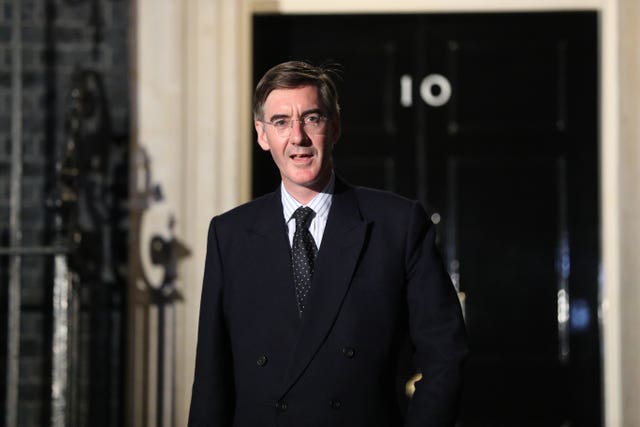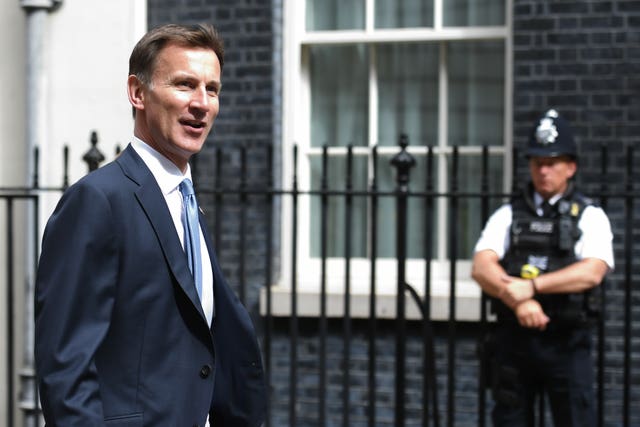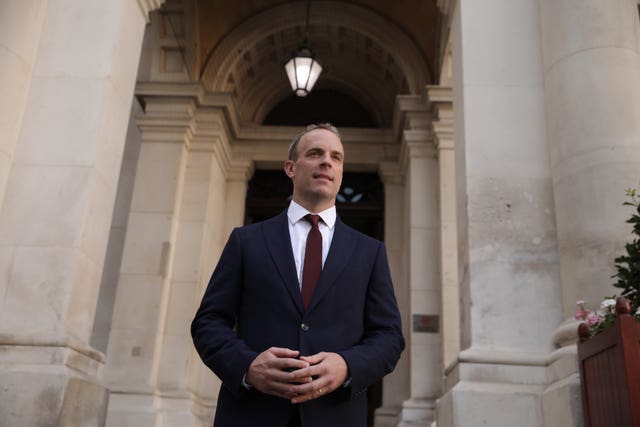
Boris Johnson will preside over his first meeting of his new Cabinet after a brutal cull of Theresa May’s top team.
Within hours of taking office on Wednesday, the new Prime Minister moved to stamp his authority, putting Brexiteers into key Cabinet posts as he vowed to take Britain out of the EU by the October 31 deadline.
In the most eye-catching appointment of a dramatic day, arch-Brexiteer Jacob Rees-Mogg – who proved such a thorn in the side of Mrs May – entered the Government as Leader of the Commons.
Unusually, however, Downing Street said that he would not be a full Cabinet member, although he will attend Cabinet meetings.

Following his appointment, Mr Rees-Mogg, who led the pro-Brexit Tory European Research Group (ERG), denied there had been a “Leave” takeover at the top of the new administration.
“Boris is bringing the country together, the party together, through his Cabinet appointments. It is not a Leave takeover Cabinet by any means,” he told Sky News.
However he issued a sharp warning to disgruntled former ministers plotting to thwart Mr Johnson’s Brexit plans that it was hard to see how they could succeed.
“The Withdrawal Act means that the default position is that we leave on October 31. That would have to be changed to stop the law taking its course,” he said.
“Parliament would have to change the law and it is hard to see how that will happen.”
Following Cabinet, Mr Johnson will address MPs for the first time as Prime Minister in a Commons statement, expected to be long on optimism, setting out his plans for government.
He is also expected to continue with middle-ranking and junior ministerial appointments.
But with more than half of Mrs May’s Cabinet having quit or been sacked, he is well aware that he could face a difficult time at Westminster.

It prompted speculation that he could hold a snap general election after MPs return in September – once they have finished their summer break which starts on Friday – to try to break the deadlock.
The most high profile casualty of Mr Johnson’s cull was his defeated leadership rival Jeremy Hunt, after he refused to accept a demotion from the Foreign Office.
Others to be sacked included Penny Mordaunt and Liam Fox, both prominent backers of Mr Hunt, who lost their jobs despite their record as committed Brexiteers.
In contrast, Dominic Raab, who quit the Cabinet over Mrs May’s Brexit deal, returned as Foreign Secretary and First Secretary of State, making him Mr Johnson’s de facto deputy.

Priti Patel, another ardent Brexiteer and Thatcherite who has previously advocated the return of capital punishment, was made Home Secretary.
And Michael Gove – who spearheaded the Vote Leave campaign in the 2016 referendum with Mr Johnson but then scuppered his subsequent leadership bid – became Chancellor of the Duchy of Lancaster in the Cabinet Office.
Stephen Barclay, another prominent Brexiteer, retains the key post of Brexit Secretary.
In another potentially controversial move, Mr Johnson brought in the abrasive Vote Leave mastermind Dominic Cummings in an advisory role.
The appointments were to some extent offset by promotions for former Remainers such as Rob Buckland, who becomes Justice Secretary, while Nicky Morgan returns to the Cabinet as Culture Secretary.
Mr Johnson also brought his brother Jo – who campaigned for Remain – back into the Government as Minister at the Business Department and at the Department for Education, attending Cabinet.
Alastair Campbell, who was head of communications at No 10 under Tony Blair, believes Mr Johnson’s appointment will “not end well”.
“I can think of no other senior position being filled by someone so unqualified to do the job, especially at this crucial time for the country,” Mr Cambpell said in a column in the Daily Mirror.
“I have seen close up how hard it is to do the job of Prime Minister. I have seen Boris Johnson close up.
“I see no way this ends well. I hope I am wrong. But this is one of the darkest days of my, and more importantly Britain’s, life,” he wrote.


Comments: Our rules
We want our comments to be a lively and valuable part of our community - a place where readers can debate and engage with the most important local issues. The ability to comment on our stories is a privilege, not a right, however, and that privilege may be withdrawn if it is abused or misused.
Please report any comments that break our rules.
Read the rules hereLast Updated:
Report this comment Cancel